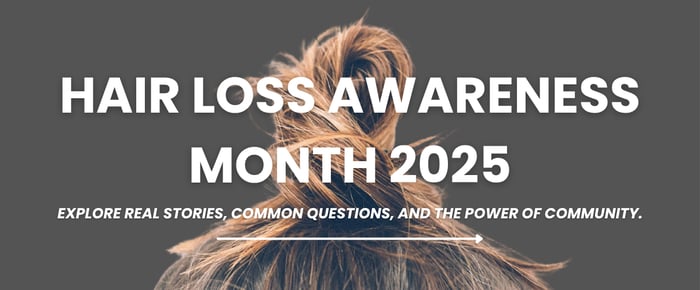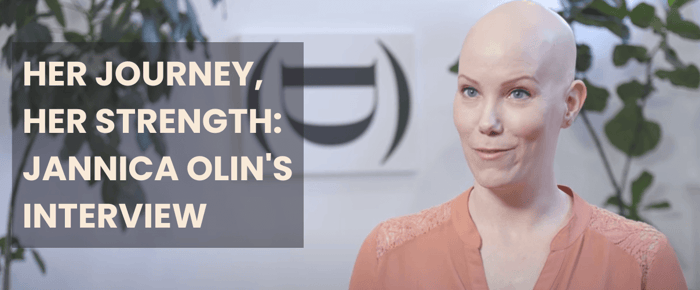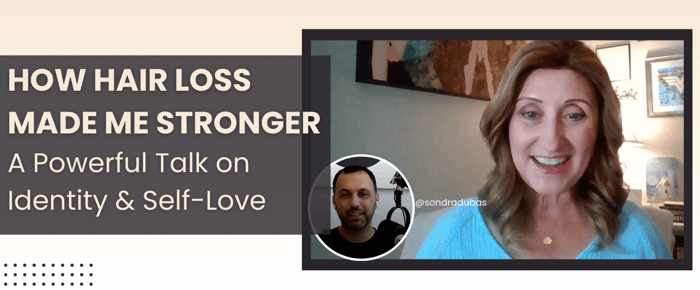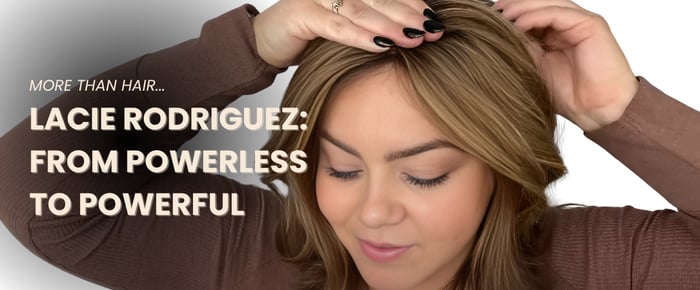Hair Loss Awareness Month in August 2025 is a time to pause and deepen our understanding of what it means to experience hair loss, especially for women. This month is dedicated to raising awareness about the causes and types of hair loss, and a chance to explore solutions like wigs and hair toppers that can help women feel empowered and embrace each day with confidence.
For many women, hair loss is a deeply personal journey that touches not just appearance, but self-esteem and everyday life. Understanding the emotional impact is essential—and so is finding a supportive, compassionate community. Throughout this month, we’re here to offer education and resources to help women navigate their hair loss journey with both confidence and care.
Table of Contents
- What is Hair Loss Awareness Month?
- Why Hair Loss Happens: Common Causes in Women
- Types of Hair Loss
- Emotional Impact: You’re Not Alone
- Conversations with Women Navigating Hair Loss
- Solutions That Support You: Wigs and Hair Toppers
- How to Choose the Right Hair Solution for You
- Hair Loss Support and Education: Finding Your Community
- Hair Loss Common Questions Answered
- FAQs
- Taking the Next Step: Empowerment and Self-Care
What is Hair Loss Awareness Month?
Hair Loss Awareness Month is celebrated each August, shedding light on an issue affecting millions. Its focus is not just on awareness, but also on education and empowerment. It’s a time that acknowledges both the physical and emotional challenges that come with hair loss.
This month, efforts aim to break the stigma associated with hair loss by fostering open conversations. People are encouraged to seek information, share experiences, and help build a stronger, more understanding community.
Key aspects of Hair Loss Awareness Month include:
- Spreading awareness about hair loss causes and solutions
- Providing resources and support networks
- Encouraging self-acceptance and empowerment
Through these initiatives, Hair Loss Awareness Month 2025 aims to shift perceptions in a positive way and encourage proactive steps toward self-care, confidence, and self-acceptance.
Why Hair Loss Happens: Common Causes in Women
Understanding what causes hair loss in women is vital for managing it effectively. From genetics to hormonal changes, hair loss can be influenced by a range of factors, each with its own characteristics and impact.
Genetics play a significant role, often resulting in gradual thinning or patchy loss. Hormonal changes, particularly during pregnancy or menopause, can also trigger shedding.
Certain medical conditions, like thyroid disorders, significantly affect hair health. Additionally, stress and nutritional deficiencies are well-known contributors.
Common causes of hair loss in women include:
- Genetics (androgenetic alopecia)
- Hormonal changes (menopause, pregnancy)
- Medical conditions (thyroid issues, alopecia areata)
- Stress and poor nutrition
By pinpointing the cause, women can better navigate their hair loss journey and explore solutions that truly support their needs. Whether it’s seeking medical advice, making lifestyle changes, or considering options like wigs or hair toppers, understanding the root cause is an essential first step.
Types of Hair Loss
There are several types of hair loss that women may experience, and understanding each one can help guide the right approach to treatment, care, and support.
Alopecia areata results in patchy bald spots that can progress rapidly. Androgenetic alopecia, or female pattern baldness, causes general thinning, typically over the top of the head. Meanwhile, telogen effluvium leads to shedding due to stress or illness.
Common types of hair loss
- Alopecia areata: patchy hair loss
- Androgenetic alopecia: female pattern baldness
- Telogen effluvium: stress-related shedding
Identifying your type of hair loss is essential in charting a course for restoration. Each type may call for different treatments, lifestyle changes, or supportive solutions—like wigs or hair toppers—all aimed at restoring a sense of confidence and well-being. Understanding your hair loss type is the first empowering step toward addressing it with clarity and care.
Emotional Impact: You’re Not Alone
Experiencing hair loss can have a profound impact on a woman’s self-esteem and mental health. It’s a deeply personal journey that can feel isolating—but it’s one that millions of women walk through, often quietly, every day.
Emotional support is a vital part of navigating the challenges of hair loss. Whether it comes from friends, family, or support groups, knowing you’re not alone—and that others truly understand—can bring a powerful sense of comfort and connection.
Sources of emotional support
- Family and friends
- Hair loss support groups
- Online communities
Finding a community can offer shared experiences and meaningful understanding. These connections help ease feelings of isolation, gently reminding you that you’re not alone in this journey. Embracing support networks like these can nurture emotional resilience and a deeper sense of strength.
Conversations with Women Navigating Hair Loss
Hearing from other women who are navigating hair loss can be incredibly powerful too. Their honesty, strength, and vulnerability offer not only practical insight, but also the reassurance that you're not walking this path alone.
Marcy Gallant
A social media influencer who is redefining beauty standards. Diagnosed with Alopecia at the age of six, Marcy's journey from self-consciousness to self-assured confidence is both inspiring and empowering.
Lacie Rodriguez
Known for her social media presence, Lacie is also a source of inspiration within the online community for female hair loss. Her journey began in college when depression and anxiety triggered her hair loss.
Sondra Dubas
Sondra spent 17 years hiding her hair loss. In this deeply honest conversation, she shares how alopecia changed her identity, her confidence, and her relationship with self-love.
Jo Tucker
Jo is a hard working single mother of three. When she lost her hair five years ago, she got open and vulnerable about her experience with alopecia from day one.
Ashley
The incredible woman behind "Life Beyond Locks." Ashley opens up about her personal hair loss journey, the challenges she faced, and how she found the confidence to embrace alternative hair.
More Stories
→ Explore our full YouTube playlist to hear from even more women sharing their honest experiences with hair loss — in their own words, on their own terms.
Solutions That Support You: Wigs and Hair Toppers
Finding the right solution can make a meaningful difference in how you show up and feel each day. Wigs and hair toppers are thoughtful, customizable options that offer a natural look — helping you express your style, your way.
Hair toppers provide volume where you need it. They're ideal for women with thinning areas. These solutions integrate seamlessly, enhancing your existing hair.
Wigs offer a full-coverage option. They're perfect for those with more extensive hair loss. Available in different styles and materials, wigs provide variety and personalization.
Factors to consider:
- Comfort
- Quality
- Realism
Choosing between wigs and hair toppers comes down to personal preference and the extent of your hair loss. Both offer beautiful, wearable solutions that can help you move through your day with ease. With a range of styles and shades to match your natural look, the right piece can free you to focus less on your hair — and more on living fully, your way.
How to Choose the Right Hair Solution for You
Finding the perfect hair solution involves thoughtful choices. Start by assessing your specific needs and lifestyle. This helps narrow down options between wigs and hair toppers.
Consider how often you'll wear your new hairpiece. Frequent wearers prioritize comfort and durability. The right fit ensures seamless integration with your daily routine.
Key points to evaluate:
- Level of coverage needed
- Daily activities and lifestyle
- Budget and long-term investment
Consulting with a hair professional can be invaluable. They provide guidance on styles and materials that suit you best. Armed with knowledge, you can make informed decisions. This can lead to a fulfilling and confident experience.
🡺 Try our FREE virtual consultation or our FREE Hair Color Match Service.
Hair Loss Support and Education: Finding Your Community
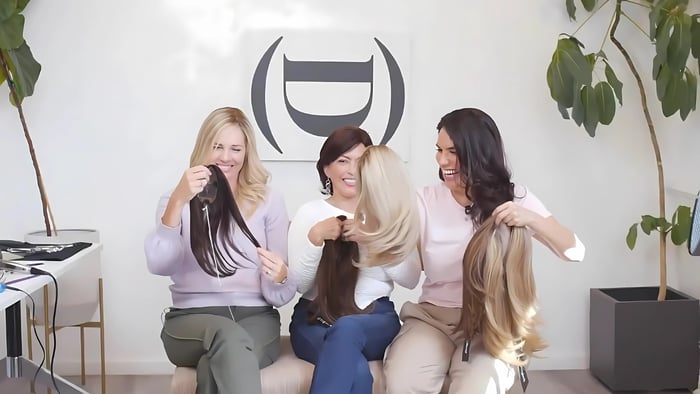
Navigating hair loss is easier with the right support. Connecting with others who share similar experiences can be incredibly reassuring. Communities provide valuable insights and emotional backing.
Resources to explore
- Online forums and social media groups
- Local support groups and meetups
- Educational webinars and workshops
These connections create space for shared stories, supportive solutions, and deeper understanding. They also offer a chance to learn more about hair loss and the options available to you. Most importantly, they’re a reminder that you’re not alone in this journey. Being part of a caring community can be a powerful source of strength, clarity, and encouragement.
Hair Loss Common Questions Answered
Experiencing hair loss often brings up a lot of questions — and that’s completely natural. Gaining a clearer understanding can help ease uncertainty and guide your next steps with confidence. Seeking out accurate, thoughtful information is an important part of feeling supported and empowered.
Explore our hair loss FAQs section below:
FAQs
What is the main cause of hair loss?
Hair loss can result from various factors, with genetics being the primary cause. Other causes include hormonal changes, stress, medical conditions, and nutritional deficiencies.
Is it normal to lose hair every day?
Yes, it's normal to lose 50-100 strands of hair daily. This shedding is part of the natural hair growth cycle and shouldn't be a cause for concern unless significant hair loss is observed.
How to know if hair is thinning?
Signs of thinning hair include noticing more hair on your pillow, in the shower, or on your hairbrush. Additionally, you may see wider parts in your hair or a receding hairline.
How much hair loss is normal?
Losing 50-100 hairs daily is considered normal. If you notice excessive hair loss, consult a healthcare professional to rule out any underlying conditions.
How do I stop my hair from falling out?
To reduce hair loss, ensure a balanced diet, manage stress, maintain scalp health, and avoid harsh treatments. Consult a dermatologist for tailored advice and solutions.
Can dying your hair cause hair loss?
Frequent hair dyeing can damage hair and contribute to breakage, but it typically doesn't directly cause hair loss. Use protective products and follow application guidelines to minimize damage.
Does wearing a hat cause hair loss?
Wearing a hat doesn't cause hair loss, but tight-fitting hats can lead to traction alopecia over time. Ensure hats fit comfortably to avoid pulling on hair.
Can stress cause hair loss?
Yes, stress can lead to hair loss conditions like telogen effluvium, where hair follicles enter a resting phase and shed more than usual. Managing stress through relaxation techniques can help.
Does adderall cause hair loss?
Some users report hair loss as a side effect of Adderall, likely due to stress or changes in appetite. If you experience hair loss while on this medication, consult your doctor.
Could dry scalp cause hair loss?
A dry scalp can lead to dandruff and inflammation, which may contribute to hair loss. Keeping your scalp moisturized and using gentle products can help.
Does high blood pressure cause hair loss?
High blood pressure itself doesn't directly cause hair loss, but certain medications for hypertension may have hair loss as a side effect. Always consult with your physician about concerns.
Could dry scalp cause hair loss?
A dry scalp can lead to dandruff and inflammation, which may contribute to hair loss. Keeping your scalp moisturized and using gentle products can help.
Can radiation cause hair loss?
Yes, radiation therapy can cause hair loss in the treated area. Hair usually regrows after treatment ends, but the timeline varies for individuals.
Does creatine cause hair loss?
There is limited evidence linking creatine to hair loss. However, some users report changes in hair thickness or shedding. Consult your physician for personalized advice.
Can birth control cause hair loss?
Some birth control methods may cause hair loss due to hormonal changes. If you notice significant shedding after starting birth control, consult your healthcare provider.
Does menopause or hormonal change trigger hair loss?
Yes, hormonal fluctuations during menopause can lead to hair thinning in women. This condition is often temporary but may require management through therapy or lifestyle changes.
Taking the Next Step: Empowerment and Self-Care
Moving forward in your hair loss journey can be an empowering act of self-care. Each step you take, whether it’s learning more, trying something new, or simply giving yourself grace — is a step toward honoring your comfort and well-being. Choosing the right hair solution, from wigs to hair toppers, can bring a renewed sense of self and freedom.
And through it all, community matters. You are not alone, and by sharing your journey, you might just inspire someone else to begin theirs with courage.
Ready to take the next step?
Explore our collection of lightweight, natural-looking wigs and toppers — or book a free consultation to get personalized support. Wherever you are in your journey, we’re here to help you feel seen, supported, and confident every step of the way.
Hera 19" | Remy Human Hair Lace Front Wig (Hand-Tied)
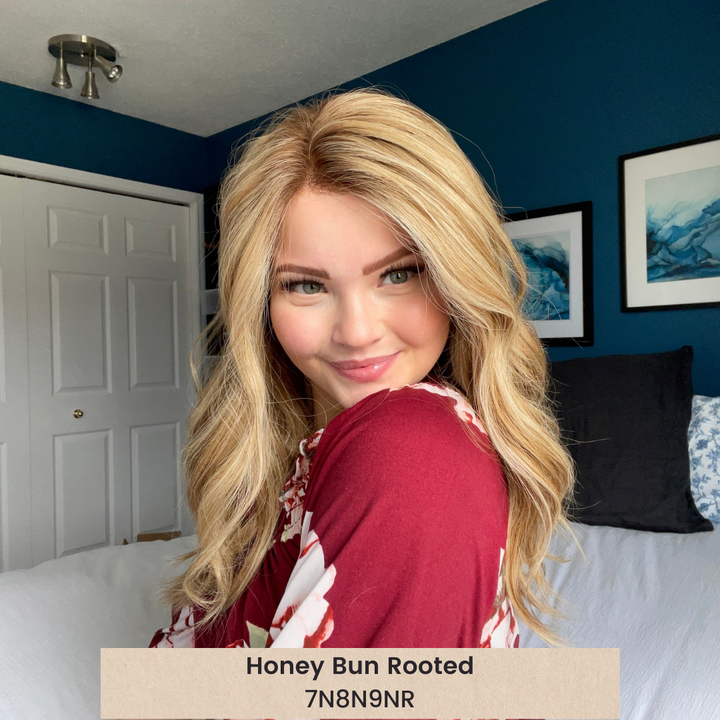
$3,299.00
Hera 19"" is made for bold beauty and everyday wear. With flowing Remy human hair and a seamless lace front, this hand-tied wig gives you freedom to move, part, and style — all without compromise. Hair Type: Remy Human Hair… read more
Sophia | Synthetic Lace Front Wig (Hand-Tied)

$555.00
Color Shown: Honey & Cream Rooted (14/22R) Hair Type:Synthetic Hair (Not Heat Friendly) Hair Length:10-28cm Cap Size: 52.7cm Base Type:Lace Front Wig, Silk mono-top, hand tied, with silicone grip Weight:89g … read more
Clio 12 L | Remy Human Hair Topper (Hand-Tied)

$1,789.00
Clio 12 L is a lightweight, hand-tied Remy human hair topper designed for women with thinning hair or early-stage hair loss. Made with 100% Remy hair, it offers soft movement, natural volume, and a secure, comfortable fit for everyday wear.… read more
Clio 8 L | Hand-Tied Synthetic Hair Topper (Heat-Friendly)

$308.00
Hair Type: Heat-friendly synthetic Hair Length: 8" Hand-Tied Base Size: 6" x 7" Base: LaceFit with 1/8" PU Perimeter with Underknotting Weight: 3.0 oz Meet your new go-to for effortless everyday volume. The Clio 8 L is a hand-tied heat-friendly synthetic hair topper designed to… read more


